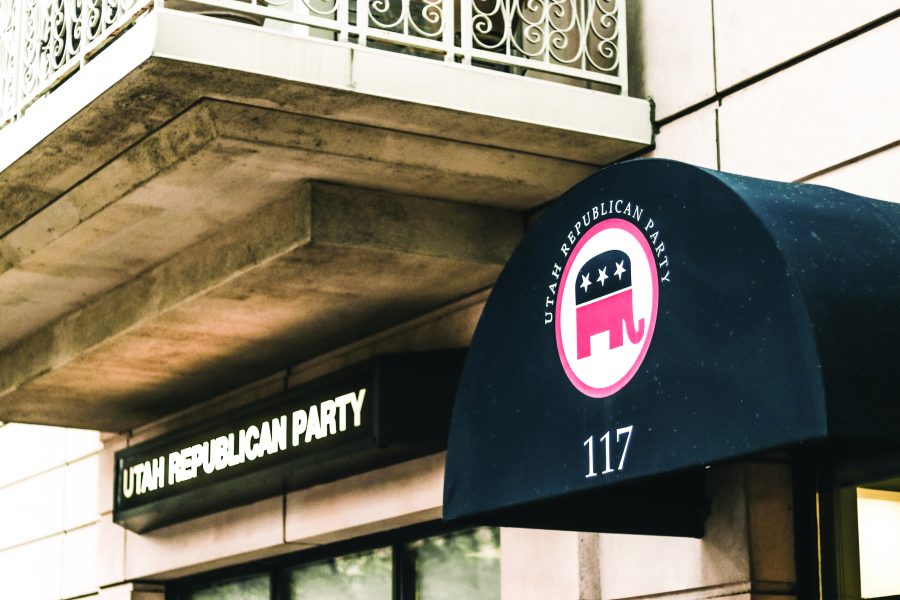Cushman: It’s Time for the GOP to Encourage Women Leaders
April 7, 2021
Recently, more than half a dozen women from the Salt Lake County Republican Party have spoken out about the toxic environment they experienced within their party. Though more and more women have been making their voices heard in politics recently, with historic wins in the 2020 election, women are still politically underrepresented both nationally and in Utah. Though a problem within both major parties, gender disparities are especially wide in the GOP, which has much less female leadership. The Republican Party needs to do more to include women and encourage them as leaders.
Women make up half of the country, and we deserve to be represented. But encouraging women in politics is also important because female leaders often have a unique understanding of policy issues like women’s health and public safety. Additionally, studies have shown that women are more likely to cross party lines and engage in participatory policymaking, and are more responsive to their constituents’ needs. They also work less in terms of hierarchy than their male counterparts. Having leaders who bring a different perspective and tackle problems in unique ways makes our democracy stronger and more responsive to us, its constituents. We need to encourage women to engage with government and take on leadership roles.
However, few women in our state have experienced that encouragement. On the contrary, women in the Salt Lake County GOP have been sexualized and objectified by their male coworkers. When Laurie Stringham used the phrase “more, more, more” in a video for her 2020 county council campaign, prominent Republican Dave Robinson called her to say that the phrase made her sound like she was “having an orgasm,” and that she was “whoring herself out” for votes. Other Republican women have expressed feeling that the county GOP was a toxic environment for women — and said that when they recently reached out to County Republican Party Chair Scott Miller to ask for change, their concerns were dismissed. The experiences of these local Republican women did not encourage them to engage in policymaking or pursue leadership roles. Instead, the party’s culture of bullying and harassment demeaned, discouraged and discriminated against them. If I was in a situation where my coworker or supervisor demeaned me or sexualized me in that way, I know I would feel violated and put down.
In March, the Salt Lake Tribune questioned Miller about the party’s gender discrimination. He responded by calling his female colleagues out by name in a party-wide email, labeling them “sore losers” and perpetuating the bullying culture to which the women had already been subjected during the recent campaign season. The email drew intense backlash — including a press release from Gov. Spencer Cox and Lt. Gov. Deidre Henderson condemning the email.
It’s good to see these Republican women come forward, be heard and get defended by the states’ highest-ranking GOP members. It’s a relief that this sexism has been met with outcry rather than swept under the rug like it might have been in the past.
However, that does not mean Utah has done enough to give Republican women, and women in general, a voice in policymaking. Utah ranks as the second most sexist state in the nation. This rampant misogyny is evident in the way women in the county GOP have been treated, but Utah women in every field experience discrimination — and electing more women to public office is the first step in putting a stop to it.
We have only had one female governor in Utah history. We have only had four women elected to serve in Congress. 20% of our state executive offices are held by women, compared to a national 30.3%, and women hold only 24% of our state legislative seats, where they make up 30.8% of legislators nationwide. This disparity is worse in the national Republican Party. Last year, though a record number of Republican women elected to Congress, there were still only 38 of them. The Utah GOP could work to fix that disparity by encouraging women and providing them with the resources to become leaders.
People interested in running for office generally start with small, less competitive races to establish themselves, working up to run for bigger state and national offices. Utah State Sen. Karen Mayne explained in an interview that starting in public service at the city or town level can give women “a feel for public service,” and allow them to move up through the ranks. It is important to establish a pipeline for female leadership by electing women to small and big offices alike, so they have the pathways to work up to the nation’s most powerful roles.
We also need to expect more from our Republican leaders. The most useful resource during challenging political campaigns is a friend or support network with other candidates. Minnesota Rep. Michelle Fischback, a national congressional leader, said that her relationship with fellow Republican Rep. Elise Stefanik was important in helping her win. She had someone to call for advice in her hardest moments. Our public leaders of all genders have a responsibility to be that resource for women interested in politics.
It’s critical to our progress as a state that we give women more opportunities to govern, especially within the GOP. Mayne emphasized the importance of having multiple perspectives and experiences in our government. Ensuring that women have an equal share of political power would make Utah more democratic and more responsive to its citizens’ needs. Though speaking out to defend women is part of that goal, we also need to provide women in politics the resources they need to share and lead with their own voices.








